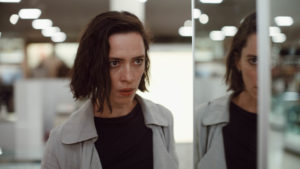And a side of horror
“Resurrection” has been widely described as a “psychological thriller” and a “horror” film. The horror content is not of the sort common to, say, 1980s slasher films, in which a pretty girl might be dispatched every 10 minutes. There are only two scenes that qualify as horror; one lasts a few seconds, the other, near the end of the film, about 5 minutes. Both will make a reasonable viewer uncomfortable, and the second will force some to turn away. Even so, the horror label is inaccurate. “Psychological thriller” is not, yet even that term fails to capture the complexity of this intense drama.
At the center of the film is Margaret, the consummate neurotic, brilliantly rendered by Rebecca Hall, who wrote (from Nella Larson’s book) and directed last year’s “Passing.” Margaret has a managerial position in an anonymous corporation, which fits nicely with the high modernist, alienating government complex of Albany, New York, where the movie was filmed. She is rail-thin, obsessive-compulsive, a fast—if excessively determined and rigid—runner, an (overly) authoritative mentor/therapist to the intern Gwyn (Angela Wong Carbone), and a hovering, controlling mother to her almost 18-year-old daughter Abbie (Grace Kaufman, who does annoyance to perfection). Except for Abbie and Peter (Michael Esper), a nice married man with whom she has occasional sex, she’s radically isolated. Although she does her best to hold herself together, it becomes increasingly difficult. Margaret’s marked physical decline parallels her psychological deterioration. But why?
The answer to that question is the essence of the film, and it doesn’t come easily. Margaret’s descent—her incremental loss of an already fragile sense of self— begins with a blast from the past, the appearance, after an absence of 22 years, of former boyfriend David (an appropriately languid, unctuous and creepy Tim Roth, who continues to offer surprises even though he’s a familiar face from film and TV). Margaret first gets a glimpse of David at a professional conference, then at a shopping mall, later on a park bench and, curiously and repeatedly, in an inhospitable space under a thruway, turning the film, or so it seems, toward the ”stalker” genre, a horror staple.
David has something to work out with Margaret, something horrific for her, that has to do with their relationship when she was—you guessed it—18. David was, and is, disarming, calculating and highly manipulative (shades of Charles Manson and Svengali), and there’s more than a hint of sado-masochism in their past (and present). Their bond, tainted as it is, can also be understood in feminist terms: an older man taking advantage of a naïve girl who doesn’t yet know her own mind. She got pregnant.
So, another answer to the “why” question is motherhood, an issue “Resurrection” shares with a plethora of recent films, including “The Lost Daughter,” “Petite Maman,” “Spencer,” “Parallel Mothers,” and “Happening.” Margaret is the guilt-ridden “bad mom,” consumed by traumatic events of decades ago, now losing the ability to repress what happened, or what she thinks happened, displacing her neuroses onto her teenage daughter.
Motherhood, a feminist perspective, a stalker from the past—each has a role in shaping one’s understanding of the film. They’re valid frameworks, but insufficient. Haunting the narrative is the possibility that David, in his recent incarnation, is a phantom, a projection of Margaret’s no longer repressed guilt. He’s never seen by anyone except Margaret, and he appears in some unlikely places. His “story” is preposterous. When Gwyn, on hearing Margaret’s account of what happened to her years ago (a rare filmic moment when telling, rather than seeing, actually works) says that the story can’t be true, it’s a sign that maybe it isn’t. The final scene is not only beyond belief; it’s filmed with just a touch of ghosting. What we’re seeing isn’t “real,” except insofar as it’s “real” to Margaret. The one false note in this construct is the very tactile room key on the diner table.
Once one starts down the path of questioning Margaret’s reality, the narrative loses coherence. From a messy kaleidoscope of possibilities, one could conclude writer/director Andrew Semans is focused principally on engendering terror and disgust in the viewer. The world view underpinning his use of the thriller/horror genre does not rise to the level of Jordan Peele’s in “Get Out” or “Us.”
At its best (and not everyone will see it that way), “Resurrection” manages to marry a powerful, tension-filled, “psychological thriller” with a rich analytic feast. Sauce for the goose, and for the gander, if one can stomach it.
Date: 2022
Stars: 3 (out of 4)
Director: Andrew Semans
Starring: Rebecca Hall, Tim Roth, Grace Kaufman, Michael Esper, Angela Wong Carbone
Country: United States
Language: English
Runtime: 103 minutes
Other Awards: One nomination to date
Availability: Showing in some theaters nationally; for rent or purchase streaming on AppleTV, Vudu, and Spectrum on Demand; see JustWatch here for full availability.
Lead image: Rebecca Hall brilliantly renders Margaret, the neurotic center of this psychological thriller.
See all Five Cent Cine reviews by 2 Film Critics
The post Five Cent Cine: Resurrection appeared first on Buffalo Rising.

